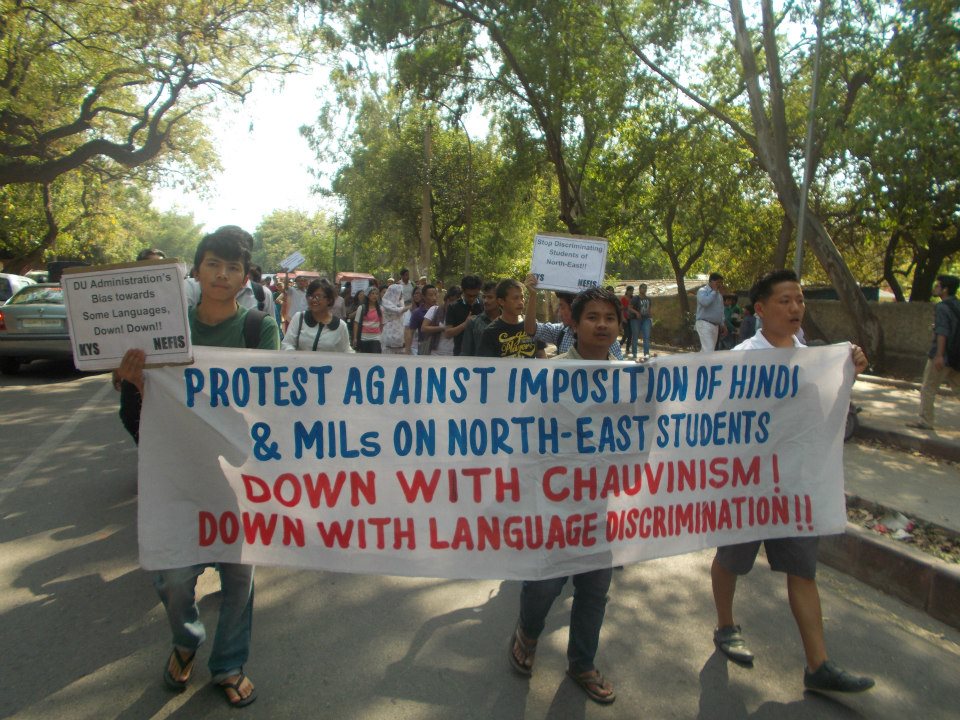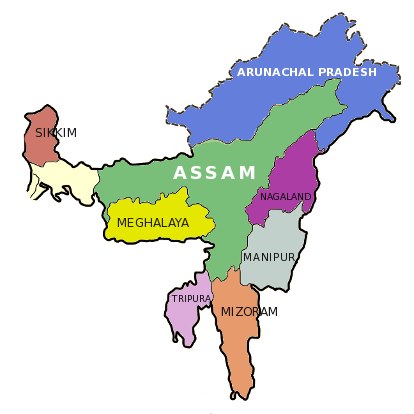In India, language politics have a long history. According to The Economist, the number of languages spoken in India is 438. However, the constitution recognizes only 22 scheduled languages.
Controversy arose as Delhi University has recently made it compulsory for students to study one paper in Hindi or any Modern Indian Language listed in the Eighth Schedule of the Constitution (Assamese, Bengali, Bodo, Dogri, Gujarati, Kannada, Kashmiri, Konkani, Maithili, Malayalam and Manipuri). Mandatory Hindi or any “Modern Indian language“ (MIL) would be difficult for the students who speak neither Hindi nor any of the modern Indian languages.
Islamabad based Indian journalist Rezaul Hasan Laskar @Rezhasan says on Twitter:
@Rezhasan (Rezaul Hasan Laskar): @rakeshmani Still no reason for folks in North India to impose Hindi on a lot of us who don't speak the language. @MrSamratX

Students protest the imposition of Hindi and Modern Indian Languages, Image courtesy NEFIS Delhi Facebook Page
The North-East Forum for International Solidarity (NEFIS) organized a protest of around 200 people against the imposition of Hindi/Modern Indian languages upon the students of the North-East. It was reported in the Manipur news and Sanhati:
No one from the administration came out to meet us despite our constant appeal to discuss the issue. We were manhandled by the security outside the office and sexist abuses were hurled at women students.
NEFIS Coordinator Chinglen Khumukcham told Business Standard that the University is ill-equipped to teach the MILs so Hindi would be the automatic choice:
There would be problems even for the communities that speak MILs like Manipuri, Assamese etc because the infrastructure and faculty strength for these languages is too small to be able to cover the whole of university.
The Asian Centre for Human Rights has reportedly filed a complaint with the National Human Rights Commission (NHRC) against the introduction of Hindi as a mandatory subject in Delhi University.
The NEFIS has submitted a memorandum to the vice chancellor of DU saying the imposition of Hindi or MILs upon the students of the North-East is unfair as most of these languages are alien to them. Protests on the issue have been held on March 22 and March 25. Khumukcham also said:
This gross neglect of the special needs of the students of the North-East is not a new thing. It is our observation that in the framing of university polices the interests of the students from the North-East is always neglected. It is for this reason that we made this fresh instance of bias an occasion for us to rise above community lines and put forward a united protest to safeguard our common interests.
A Tamil blog commented:
Its Good to see youth from North-East actively voicing against Hindi imposition… Hopefully youth from various linguistic groups could start networking with each other, towards our common goal of bringing constitutional amendment that no single language is sole official language of union, all 8th Schedule Languages are official language of union and the lethargy of updating 8th schedule list must be condemned and be updated regularly.
Students are now gearing up for additional protests on the 10 of April, according to Time for Change India and the Facebook Page Stop Discriminating People From the North-East India.








5 comments
you should join FB groups like https://www.facebook.com/groups/PromoteLinguisticEquality/ to discuss and network with other lingustic group who are facing the same problem~!
I hope this is rubbish idea to protest since Hindi is our national language. I am sure you don’t discard your grandmother and only accept your mother in life. Similarly, regional language is your mother and national language is your grandmother. Think logically. Do you think Americans had language problem in US? There is no boundary restricted in the whole country. But, because of you guys, there is boundary in every corner in this country. And hence politics is very easy to kill up with some small issues. Be mature in the true sense. Ok.
Prove hindi is national language first. It’s your myth that hindi is national language.
Please have a look at my document ‘International opinion on language issues: mother tongue is the key to education, knowledge, science and English learning’, along with some more documents on language issues at http://punjabiuniversity.academia.edu/JogaSingh/papers. This document provides the gist of international research, expert opinion and international linguistic situation. It is available in Punjabi (Gurmukhi and Shahmukhi), Tamil, Telugu, Kannada, Maithili, Hindi, Dogri and English from the above website. It contains vital information relevant for the life and development of mother tongues and, more importantly, the role mother tongues play in development in general and, very importantly, in learning of a foreign language. I can send you the pdf copy if you provide your email. You can also watch three video talks in Punjabi based on this document at http://www.youtube.com/watch?v=a8w6xNrCP88, http://www.youtube.com/watch?v=Ux8Bg95BSRg, http://www.youtube.com/watch?v=w4njNvR4UI0&feature=share. One video talk on language issues can be watched in English at https://www.youtube.com/watch?v=Xaio_TyWAAY&feature=youtu.be.